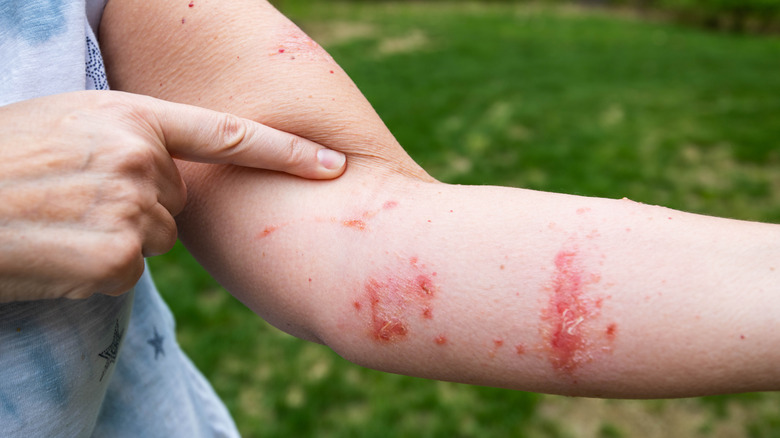Can Poison Ivy Spread On Your Body?
Poison ivy is a plant found throughout most of the United States, except for Hawaii, Alaska and parts of the West coast, according to the U.S. Food & Drug Administration (FDA). The oily resin in its leaves can cause an allergic reaction on the skin in the form of a rash when a person comes in contact with it (via the Mayo Clinic). Symptoms of a poison ivy rash include redness, itching, swelling, and blisters.
A poison ivy rash cannot be spread from person to person and it is also not contagious from one part of your body to another (via Healthline). However, an exception is if you haven't washed your hands or body after coming in contact with the plant and the oil is still on your skin since the rash occurs in areas where the oil has touched. It is also possible to notice the rash spreading over time, but this is because the rash can develop more slowly over different body parts. Additionally, if you repeatedly touch objects contaminated with the plant's oil, such as the clothing you wore on the day of exposure, this can lead to another poison ivy rash.
How to treat a poison ivy rash
If you come into contact with poison ivy, wash your skin right away. Washing off the oil may reduce your chances of developing a poison ivy rash and prevent it from spreading to other parts of your body. If you do develop a rash, it will typically go away on its own, but there are a number of at-home treatments available to help with symptoms, such as itching. You can try an over-the-counter cortisone cream or ointment for the first few days and calamine lotions or creams containing menthol can also provide some relief. Oral antihistamines, such as diphenhydramine, can help with the itching and also help you sleep better. Additionally, taking baths with cool water and half a cup of baking soda or an oatmeal-based bath product can reduce itching.
If your rash is widespread or causing blisters, call your doctor, as they may want to prescribe medications to reduce swelling. If your rash is accompanied by fever, difficulty breathing or swallowing, swelling on the face (especially if it causes an eye to swell shut), or itching that is so severe it is impossible to sleep, go to your local emergency room right away (via the American Academy of Dermatology). These symptoms may signify an infection or a severe allergic reaction and may require immediate care.


